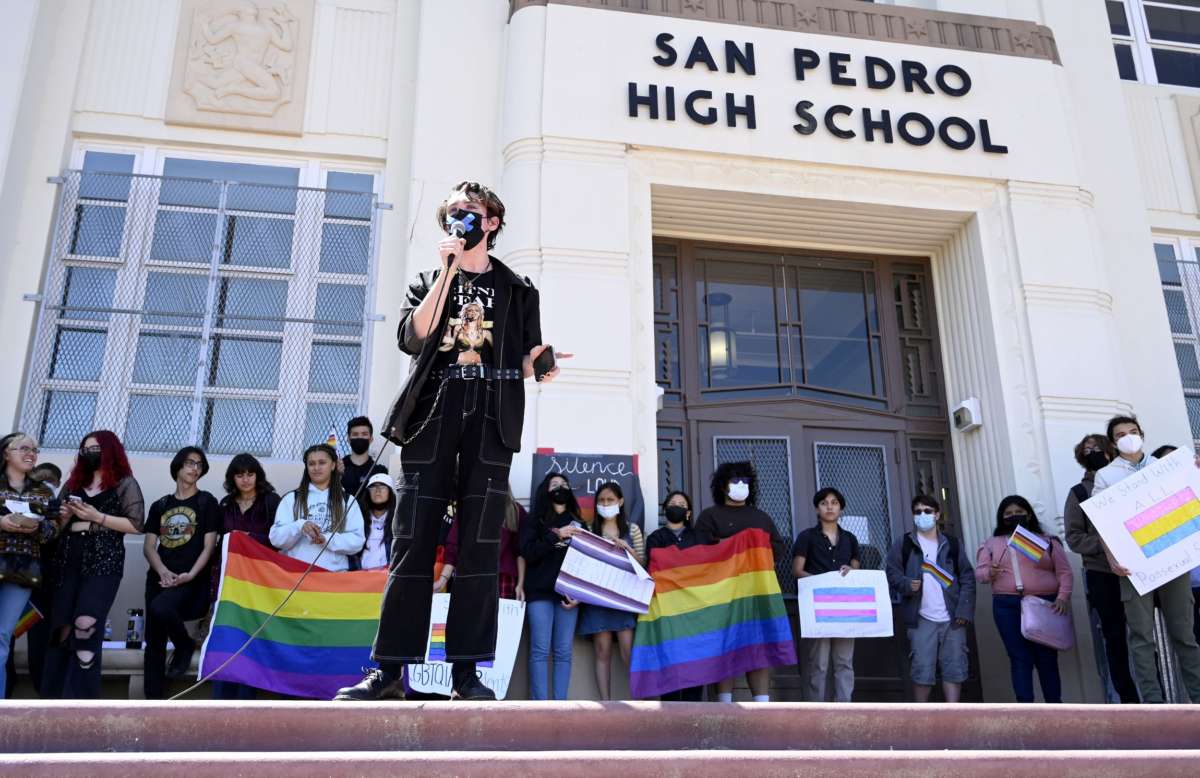Republicans have been attacking schools that teach the history of racism in the U.S. and provide inclusive environments for LGBTQ students, hoping to capitalize on a tactic that worked in one noteworthy election last year — but a new report suggests that these efforts may ultimately backfire for the party.
Researchers and pollsters talking to Politico about GOP candidates running in the 2022 midterms said that campaign promises to restrict discussion of racial or LGBTQ issues in classrooms energize Republicans’ base, but push away centrist voters who view their attacks as being too hard on children.
“Their hypothesis was that it would be a swing issue, particularly for suburban voters and parents, and not just a base issue,” Celinda Lake, a Democratic pollster, told the publication. “The way they’ve overplayed their hand is that it’s just a base issue, and in fact alienates some of the suburban voters — particularly suburban parents.”
“The far-right MAGA strategy of using kids and schools as culture war pawns has failed and continues to fail to win converts,” a report from Democratic polling GBAO firm stated last month.
Even GOP-aligned analysts are warning against the strategies that many Republican candidates have employed.
“We see more and more Republicans continuing to play to their base instead of trying to expand their audience. What we really find is the voters really are more in the middle,” Paul Bentz, an Arizona-based Republican pollster, told Politico.
Around 90,000 political ads about education have aired in the U.S. since the start of September. Many of the ads promoted by GOP candidates contain bigoted and baseless accusations against Democrats.
An attack ad against Michigan Democratic Gov. Gretchen Whitmer, for example, accuses her of wanting “a drag queen in every classroom indoctrinating our children.” Democratic Gov. Tony Evers of Wisconsin, meanwhile, has been hit with ads accusing him of wanting books in public schools that “shame kids for being white,” a common — but false — talking point from right-wingers who use fearmongering about critical race theory to activate their base.
Last year, when then-GOP candidate for Virginia governor Glenn Youngkin was running for office, he employed a similar strategy against his Democratic opponent, promising to restrict classroom discussions of racism in the state. Following Youngkin’s win, House Minority Leader Kevin McCarthy (R-California) promised that the GOP would be “the party of education.” Instead of developing proposals to increase resources for teachers and students, however, Republicans have been promoting a so-called “parents’ bill of rights” to empower bigoted school district residents to file complaints about public school curriculums.
Over the past year, right-wing parents, politicians and conservative groups across the country have sought to limit curriculum or ban books in school libraries that explore race or LGBTQ themes. Florida, for example, passed a “Don’t Say Gay” bill into law that limits teachers’ ability to talk about LGBTQ subjects. Texas, which has banned more books over the past year than any other state, has also limited how teachers can discuss racism.
Forty-two states in total have introduced bills to restrict public school educators from teaching about the history of racism in the U.S., with 17 states so far enacting a law or state policy doing so.
A recently published report from researchers at the University of Southern California demonstrates that, while right-wing voters support implementing such restrictions in public school classrooms, most Americans oppose these measures.
“Americans overwhelmingly want high school to be a place where students learn about multiple sides of controversial topics, and they are free to access books touching on a variety of controversial content,” the study found.
Fifty-nine percent of adults in the U.S. say they back lesson plans about transgender rights and gender identity, while 63 percent say they support teaching about sexual orientation, the researchers said. Sixty-five percent say gay rights should be taught in schools.
Ninety-four percent back lesson plans about the “contributions of women [and] people of color” in the U.S., while 95 percent agree that the topic of slavery should be taught in schools and 86 percent believe that racial inequality should be discussed in the classroom, the poll found.
Join us in defending the truth before it’s too late
The future of independent journalism is uncertain, and the consequences of losing it are too grave to ignore. To ensure Truthout remains safe, strong, and free, we need to raise $46,000 in the next 7 days. Every dollar raised goes directly toward the costs of producing news you can trust.
Please give what you can — because by supporting us with a tax-deductible donation, you’re not just preserving a source of news, you’re helping to safeguard what’s left of our democracy.
